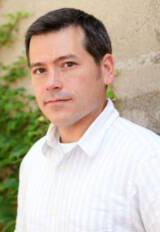 Chris Saxton, the protagonist of Jason Skipper’s debut novel, Hustle, reminds me of the young man from a classic Twisted Sister video. When called out to explain what he wants to do with his life, the answer is simple: “I wanna rock.” For Chris, becoming a rock star is the most feasible path to saving his dysfunctional family; his father is a womanizing alcoholic and his mother is downtrodden and depressed.
Chris Saxton, the protagonist of Jason Skipper’s debut novel, Hustle, reminds me of the young man from a classic Twisted Sister video. When called out to explain what he wants to do with his life, the answer is simple: “I wanna rock.” For Chris, becoming a rock star is the most feasible path to saving his dysfunctional family; his father is a womanizing alcoholic and his mother is downtrodden and depressed.
Hustle is a deeply felt and illuminating look at the trials of adolescence, hard enough to begin with and bordering on frontier justice when compounded by poverty, addiction and mental instability. Throw in a rich, troubled girlfriend and you might as well start tying the noose. Thank God for rock and roll.
Skipper grew up in Texas and has worked as a bartender, a snowboard instructor and a freelance journalist. His work has appeared in numerous journals, including Hotel Amerika and Mid-American Review. He has received awards and recognition from Zoetrope: All Story, Glimmer Train and Crab Orchard Review. I caught up with him on the campus of Pacific Lutheran University in Tacoma, where he teaches creative writing and literature.
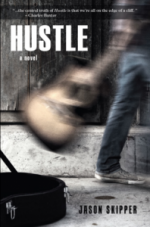 Several chapters of Hustle appeared in slightly different form in various publications. At what point in your process did you know you had a novel on your hands? I originally wrote this as a story collection. I was in grad school at Miami of Ohio, where for workshop we submitted two stories per semester. Each term, I wrote one story about these people and one story about something different. Eventually, in the fall of my second year, a professor turned to me and said, ‘So where’s the book?’ I was hesitant to write it, a coming-of-age story about a boy growing up with his hardscrabble family, wanting to become a musician. Then, around that same time, I went to an Elliott Smith show in Cincinnati. He showed up late, obviously high, and was struggling with the songs. People were walking out, but to me it felt raw and honest and beautiful, and I suddenly got this overwhelming sense of Chris saying ‘Let’s do this.’ So I committed to these people and their story. At the time I was getting interested in inter-connected short story collections, books like How the Garcia Girls Lost Their Accent by Julia Alvarez, Jesus’ Son by Denis Johnson, and Drown by Junot Diaz, collections whose structures have the authority of a life lived. So I followed that model. But once it was drafted, the manuscript felt more like a novel, so I dropped the stories less connected to Chris and concentrated on weaving the chapters together, to tell his story.
Several chapters of Hustle appeared in slightly different form in various publications. At what point in your process did you know you had a novel on your hands? I originally wrote this as a story collection. I was in grad school at Miami of Ohio, where for workshop we submitted two stories per semester. Each term, I wrote one story about these people and one story about something different. Eventually, in the fall of my second year, a professor turned to me and said, ‘So where’s the book?’ I was hesitant to write it, a coming-of-age story about a boy growing up with his hardscrabble family, wanting to become a musician. Then, around that same time, I went to an Elliott Smith show in Cincinnati. He showed up late, obviously high, and was struggling with the songs. People were walking out, but to me it felt raw and honest and beautiful, and I suddenly got this overwhelming sense of Chris saying ‘Let’s do this.’ So I committed to these people and their story. At the time I was getting interested in inter-connected short story collections, books like How the Garcia Girls Lost Their Accent by Julia Alvarez, Jesus’ Son by Denis Johnson, and Drown by Junot Diaz, collections whose structures have the authority of a life lived. So I followed that model. But once it was drafted, the manuscript felt more like a novel, so I dropped the stories less connected to Chris and concentrated on weaving the chapters together, to tell his story.
Chris’s grandfather, the con-man Buddy, tells him, ‘Deep down, people want to believe you, and that makes it easy. Most times, all you have to know is, What does this person want to hear? Not what do you want to tell them. That’s where most people mess up.’ As a fiction writer, do you ever feel like a con man? Both con artists and writers have to get people to suspend disbelief in order to engage with the narrative, until eventually they allow themselves to be taken. To make that happen, you have to create a world through imagery and detail that will appeal to as many senses as possible. Once you have people in that world, you can work their sensibilities, make them laugh or break their hearts. A big difference is that with con-men, it’s about, ‘Take, take, take,’ but as a writer, you ideally want to give something back. The knowledge of an experience and hopefully a newfound sense of connectedness.
I love this line, spoken by Chris’s babysitter, Theresa: “Desperate people say stupid shit.” That is some serious wisdom. It seems like a central point of the book, how to deal with that moment of desperation, whether it’s your own or someone you’re counting on.Will you elaborate on that? I like to capture people at their most desperate moments, when most options have been exhausted. At that point, aside from violence, honesty and truth are often the only withstanding resources, and people are left to finally say exactly how they feel. Which can at times be quite violent. This story is full of desperation– sometimes quick and fleeting, other times longstanding and resonant – and I think the deliberation that goes into what is revealed is often proportionate to the hurt and freedom that’s at stake. Sometimes this leads to funny moments, sometimes quite tragic.
Any novel that includes bands like Minor Threat, the Descendents, and the Old 97’s gains instant credibility in my book. As those aren’t widely known artists, I’m assuming you have some background in music yourself? Some of my earliest memories are of music and being in honky-tonk bars. My dad was a bartender, and to pass the time he would give me a dollar in quarters. I could choose between video games or the jukebox, and I chose the jukebox. Some nights he would put me up on the stage while the house band played. I loved all kinds of music, from Tanya  Tucker to Motley Crüe to Run DMC, and I liked to write stories. For my eighth birthday I got two presents: a journal and a Casio keyboard. I grew up quite poor, and like Chris I thought of music as a way out. I got my first guitar at a flea market when I was ten and immediately started writing songs. I played in bands in high school, and I studied journalism. I would sneak out on school nights and drive alone to Dallas to get into clubs with my older brother’s ID to see local bands like Tripping Daisy, Reverend Horton Heat and the Old 97s. I thought if I was going to do something with music it would happen in college, when I was at the University of North Texas in Denton. But more often being in a band felt like having three girlfriends, given all of the compromise. And I started to publish with magazines. I discovered Pavement and Wallace Stevens around the same time, and sensed a similarity between the ways Stephen Malkmus and Stevens play with language. I started reading more—writers like William Carlos Williams, Dorothy Allison, Stuart Dybek—and thought,
Tucker to Motley Crüe to Run DMC, and I liked to write stories. For my eighth birthday I got two presents: a journal and a Casio keyboard. I grew up quite poor, and like Chris I thought of music as a way out. I got my first guitar at a flea market when I was ten and immediately started writing songs. I played in bands in high school, and I studied journalism. I would sneak out on school nights and drive alone to Dallas to get into clubs with my older brother’s ID to see local bands like Tripping Daisy, Reverend Horton Heat and the Old 97s. I thought if I was going to do something with music it would happen in college, when I was at the University of North Texas in Denton. But more often being in a band felt like having three girlfriends, given all of the compromise. And I started to publish with magazines. I discovered Pavement and Wallace Stevens around the same time, and sensed a similarity between the ways Stephen Malkmus and Stevens play with language. I started reading more—writers like William Carlos Williams, Dorothy Allison, Stuart Dybek—and thought,  “This is what I want to do.” Music is still a constant in my life, and it’s important to my writing, both in terms of process and tone.
“This is what I want to do.” Music is still a constant in my life, and it’s important to my writing, both in terms of process and tone.
Based on musical references, I gather that your novel is set in the late 1980’s/early 1990’s. Any reason you chose that era, other than its sheer awesomeness? In my work, I am generally interested in moments of collapse. I grew up in the late eighties and early nineties, when it seemed collapse was everywhere. Small businesses, like Wrendon’s seafood store, were getting decimated by places like Safeway. Family dynamics were also shifting. Divorce seemed a rite of passage with many kids I knew, and you had boys like Chris growing up closer to their mothers. Women were finally speaking up to their husbands. Absent fathers were suddenly wanting relationships with their sons. And all these new stepfathers were struggling to fit in. I think ideas of masculinity were changing rapidly as well, probably due in part to this shifting family dynamic but also MTV. Another interesting collapse, and this is important to the book, was with the boundaries between musical genres. You’ve got the Clash influenced by reggae, Run-DMC recording with Aerosmith, Beastie Boys with punk and college rock getting popular. I think this allowed musicians more freedom to find their voices, which is important to the novel and Chris’s growth. He is surrounded by all of these naturally articulate men, but he himself is not.
ideas of masculinity were changing rapidly as well, probably due in part to this shifting family dynamic but also MTV. Another interesting collapse, and this is important to the book, was with the boundaries between musical genres. You’ve got the Clash influenced by reggae, Run-DMC recording with Aerosmith, Beastie Boys with punk and college rock getting popular. I think this allowed musicians more freedom to find their voices, which is important to the novel and Chris’s growth. He is surrounded by all of these naturally articulate men, but he himself is not.
What kind of stuff do you think Chris would be reading? He names his band “The Earliest Ending” after a line in a Wallace Stevens poem. I think he’d like J. D. Salinger. Cormac McCarthy definitely.
 What are some of your favorite books and authors, both the influences on your development as a writer and those you have read recently? Because a lot of my stories deal with struggles with communication, I am interested in writers who use imagery to convey the inner lives of characters. I grew up in Texas, around people who didn’t typically express their feelings, and you had to figure them out based on their appearances and actions. Flannery O’Connor was a big influence. Denis Johnson. Dorothy Allison and Breece D’J Pancake. I think Ann Pancake and Jaimy Gordon are both tremendous in their ability to craft a sentence and convey point-of-view through language. Music was also vital, particularly a Denton band named Centro-matic. These days I find the writers who most excite me are the ones who remind me of the boundlessness of fiction. I see it with Alice Munro, who in one sentence can take you there and back. I also like Lauren Groff, and I’ve developed a recent crush on Jennifer Egan’s work. For the next book, I’m
What are some of your favorite books and authors, both the influences on your development as a writer and those you have read recently? Because a lot of my stories deal with struggles with communication, I am interested in writers who use imagery to convey the inner lives of characters. I grew up in Texas, around people who didn’t typically express their feelings, and you had to figure them out based on their appearances and actions. Flannery O’Connor was a big influence. Denis Johnson. Dorothy Allison and Breece D’J Pancake. I think Ann Pancake and Jaimy Gordon are both tremendous in their ability to craft a sentence and convey point-of-view through language. Music was also vital, particularly a Denton band named Centro-matic. These days I find the writers who most excite me are the ones who remind me of the boundlessness of fiction. I see it with Alice Munro, who in one sentence can take you there and back. I also like Lauren Groff, and I’ve developed a recent crush on Jennifer Egan’s work. For the next book, I’m  listening to a lot of Cat Power.
listening to a lot of Cat Power.
What’s next for you? Right now I’m working on a book of nonfiction about my father. When I was a kid, like Chris, I would drive down to the coast with him on Thursdays to buy shrimp that we would sell from the van on the weekends, and it was a five-hour stretch each way. He drank all day, every day, and when I was twelve he started telling me these stories about his life. Really tragic stories, and he was at the center of them. He died when I was seventeen, and I found out twelve years later that aspects of those stories were made up entirely, where he had reconstructed them to make himself more of a protagonist. He had a difficult childhood and adolescence, so I’m writing a book about his life and my relationship with him and why he would make up these narratives. I’m also working on a collection of very short stories. I enjoy the form, trying to convey as much as possible in a small amount of space. Like Hustle, the book focuses on communication and its breakdowns. There’s something about that that I keep returning to. The beauty that erupts when language falls apart.
Tom Cantwell is a teacher and writer living in Eugene, Oregon. His first novel, The Seminole and the Slave, won Honorable Mention in the Writer’s Digest International Self-Published Book Awards. He is an MFA candidate in the low-residency Rainier Writing Workshop at Pacific Lutheran University. The bedtime book that Tom is currently reading to his wife and one-year-old son is Drop City by T.C. Boyle.
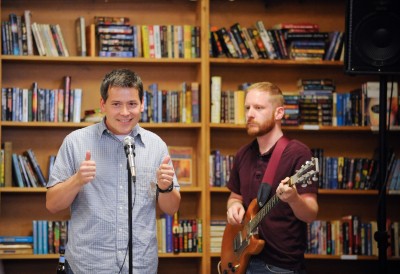

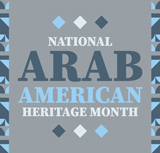
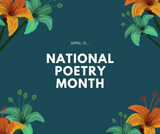
Is Jason skipper still living in Tacoma? And has he published anything new.
I’m sorry, we’re not sure where Jason Skipper is living now. It does look like he was still in Tacoma as of a few years ago. The latest book we can find from his is “Hustle” from 2011. You might want to connect with King’s Books or Parable Books in Tacoma to see if they have any further information!